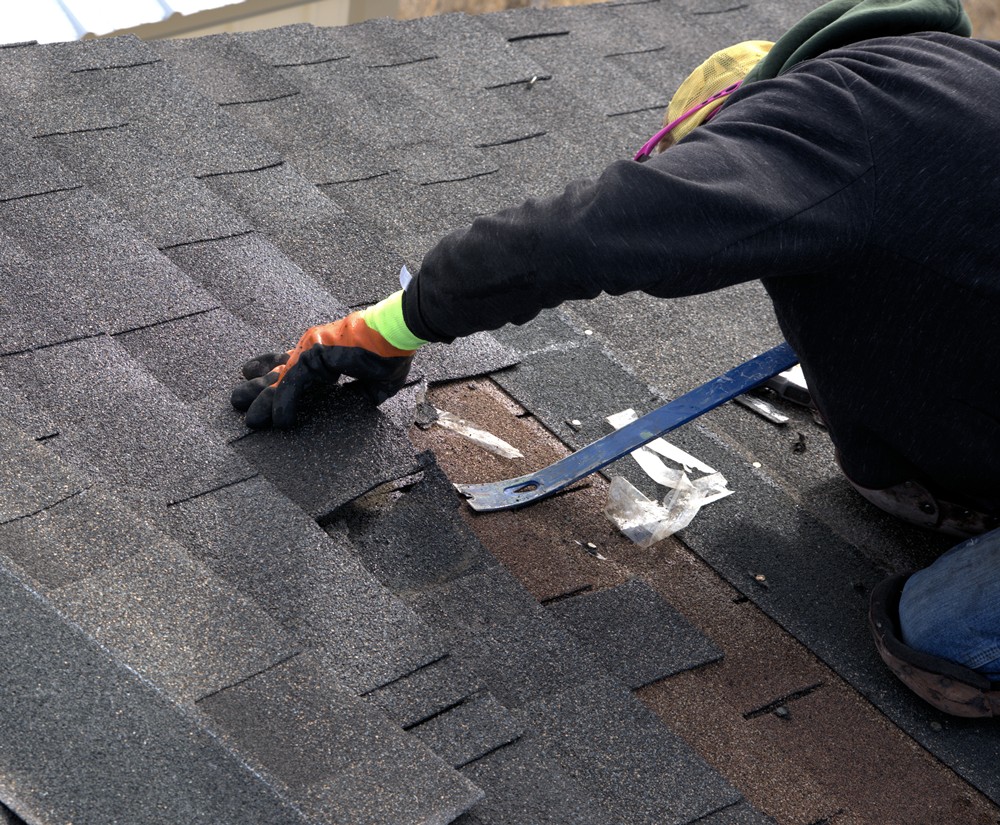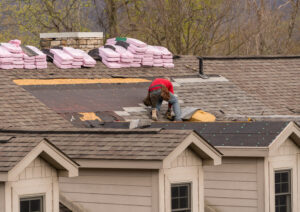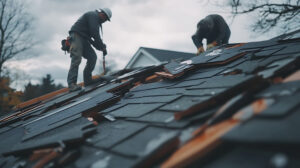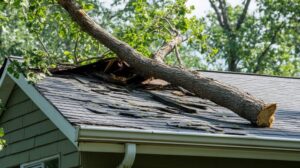When homeowners see roof damage, they often ask a big question: Should I fix my roof, or is it time for a full replacement? Choosing between roof repair and roof replacement can affect your home’s safety, comfort, and budget for a long time.
In this article, we will talk about important factors. These include the damage level, your roofing material, cost differences, and long-term benefits. This will help you make a smart choice.
Understanding Roof Damage: Repair or Replace?
Roofs age differently depending on several factors, including weather exposure, quality of roofing materials, and installation. A typical asphalt shingle roof may last around 20-30 years. If your roof is getting old or you have frequent problems like leaks, think about whether small repairs will work. It may be better to invest in a full roof replacement.
Related: How to Find a Roof Leak and Prevent Future Damage
How New England’s Climate Impacts Replacements and Repairs
In New England, the local weather impacts decisions about roofing. Homeowners must choose between repairing or fully replacing their roofs.
Homeowners in Massachusetts and nearby states deal with many weather challenges. They face heavy snow and ice in winter. In summer, they experience coastal storms, strong winds, and humidity. These conditions can accelerate roof wear and tear compared to other parts of the country.
Winter Weather and Roof Longevity
In New England, repeated freeze-thaw cycles and heavy snow loads can significantly stress roofing materials. Ice dams are a common problem.
They can cause water to back up under shingles. This may lead to hidden leaks or damage to the structure. If your roof has faced many harsh winters, even small damage could mean bigger problems. In this case, replacing the roof may be a better choice than making constant repairs.
Storm Damage Consideration
Nor’easters and seasonal storms often bring high winds and driving rain, which can loosen shingles, damage flashing, or expose vulnerabilities in older roofs. A single storm might need only small repairs. However, repeated storms can cause more damage over time.
This damage is often best fixed with a full roof replacement. This helps ensure long-term protection.
Material Selection for New England Homes
Because of the region’s weather extremes, choosing durable, weather-resistant materials is critical. Many homeowners in Massachusetts choose roofing that can handle snow, wind, and moisture. Popular options include architectural asphalt shingles and metal roofing.
If your roof was made with basic materials not right for New England’s weather, consider replacing it. Using better materials can help avoid problems later and improve energy efficiency.
Energy Efficiency in Cold and Hot Seasons
With cold winters and warm summers, proper insulation and ventilation are vital. A roof replacement lets homeowners upgrade the underlayment. It also improves attic ventilation.
Homeowners can choose materials that handle temperature changes. This leads to better energy performance all year.
In short, while roof repairs might be sufficient in milder climates, New England homeowners need to weigh the long-term impact of regional weather. Investing in a roof replacement made for New England weather often gives you peace of mind. It also offers better protection and can increase your home’s value.
Evaluating the Extent of Roof Damage
Roof damage can vary. It can be small leaks in a limited area or major wear affecting the whole roof. A thorough roof inspection from reputable roofing companies is essential to assess the severity.
- Minor Repairs: If the damage is small, like missing or broken asphalt shingles after a storm, you can often fix it easily. Simple repairs can work well for these issues. These fixes are cost-effective and can extend your roof’s life if the rest of your roofing system remains in good condition.
- Full Roof Replacement: Significant damage or widespread deterioration, such as compromised roof decking or multiple leaks, usually requires a complete roof replacement. Replacing your roof provides greater peace of mind and addresses underlying issues that minor repairs cannot resolve.
Key Factors to Consider When Deciding Whether to Repair or Replace Your Roof
Making the decision isn’t always straightforward, so consider these essential factors carefully:
- Age of Your Roof
Age is often the most critical factor. Most asphalt shingles roofs have a lifespan of about 20-30 years. If your roof is nearing or exceeding this age, repairs might be a temporary fix. A full roof replacement ensures long-term safety and saves you from repeated repair expenses.
- Frequency of Roof Leaks
Occasional, isolated leaks might only require minor repairs. However, recurring leaks in different areas indicate widespread issues. A roof replacement becomes a cost-effective solution in such situations, preventing ongoing repair costs and structural damage.
- Energy Efficiency Considerations
Modern roofing materials significantly improve energy efficiency, reducing monthly energy costs. A full roof replacement allows you to choose advanced roofing materials designed for better insulation and temperature regulation. This investment provides long-term savings and enhanced comfort in your home.
- How Long Do You Plan to Stay in Your Home?
If you plan to stay in your home for many years, getting a new roof is often a good idea. A new roof offers durability, increased property value, and fewer headaches in the long run. However, if you’re considering selling soon, minor repairs might make more sense financially.
Cost Comparison: Roof Repair vs Replacement Costs
When evaluating your decision, costs inevitably play a significant role. Here’s how to think about the investment clearly:
- Roof Repair Costs: Usually, the upfront costs are lower. Repairs can range from a few hundred to several thousand dollars. The cost depends on how much damage there is and where it is located. However, frequent repairs quickly add up, often surpassing initial expectations.
- Roof Replacement Costs: Replacing a roof has higher upfront costs but brings long-term value. The price usually ranges from a few thousand to tens of thousands of dollars. The exact cost depends on the roof type, your home’s size, and the materials you choose. Despite higher initial costs, replacement provides long-term protection, energy savings, and increases your home’s market value.
Importance of Professional Roof Inspections
Before you decide, get a professional roof inspection from a trusted roofing company. Check our tips for choosing a reliable contractor, like Olympic Roofing. They can help you understand your roof’s condition. Inspections pinpoint hidden problems, determine damage severity, and suggest the most effective solution tailored to your situation.
Olympic Roofing’s skilled technicians do detailed inspections. They help homeowners understand if they need minor repairs or a full roof replacement.
Selecting the Best Roofing Materials for Replacement
When opting for a roof replacement, it is essential to choose appropriate roofing materials. Popular options include:
- Asphalt Shingles: Cost-effective, durable, and easy to install. Usually lasts 20-30 years.
- Metal Roofing: Longer lifespan, exceptional durability, and excellent energy efficiency.
- Wood Shakes: Visually appealing, though higher maintenance and shorter lifespan.
- Composite Roofing: Offers aesthetic versatility, durability, and resistance to severe weather.
Olympic Roofing can help you select the best materials matching your home’s style, budget, and energy efficiency needs.
Benefits of Replacing Your Roof
Investing in a full roof replacement offers multiple long-term benefits, including:
- Increased energy efficiency lowers monthly utility bills.
- Enhanced curb appeal and increased property value.
- Better protection against harsh New England weather.
- Reduced maintenance and fewer repair expenses in the future.
Making the Right Choice for Your Home
Deciding to repair or replace your roof requires careful thought. You should consider the roof’s age, the damage, your plans, and your budget. Minor repairs can extend your roof’s lifespan if issues are limited to a small area. Widespread damage, ongoing leaks, or roofs close to the end of their life usually mean that replacing the roof is a smart choice.
Olympic Roofing has helped homeowners in Massachusetts for over 50 years. We offer honest evaluations, skilled repairs, and quality roof replacements. If you have small roof damage or need a new roof, talk to trusted experts. This helps you make the best choice for your home and gives you peace of mind for years.





